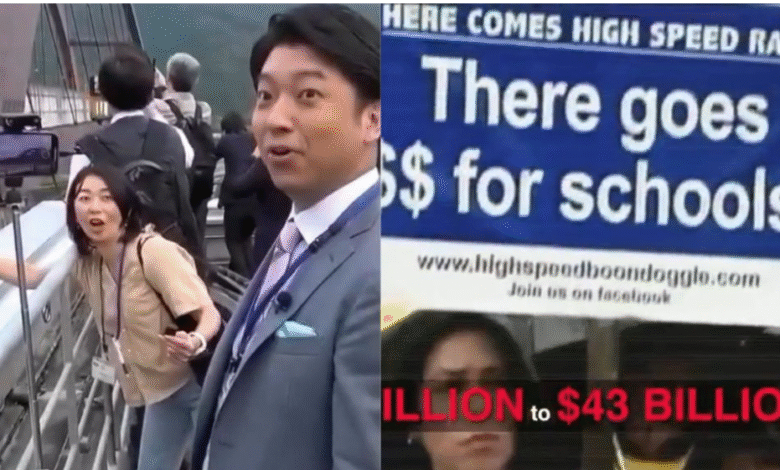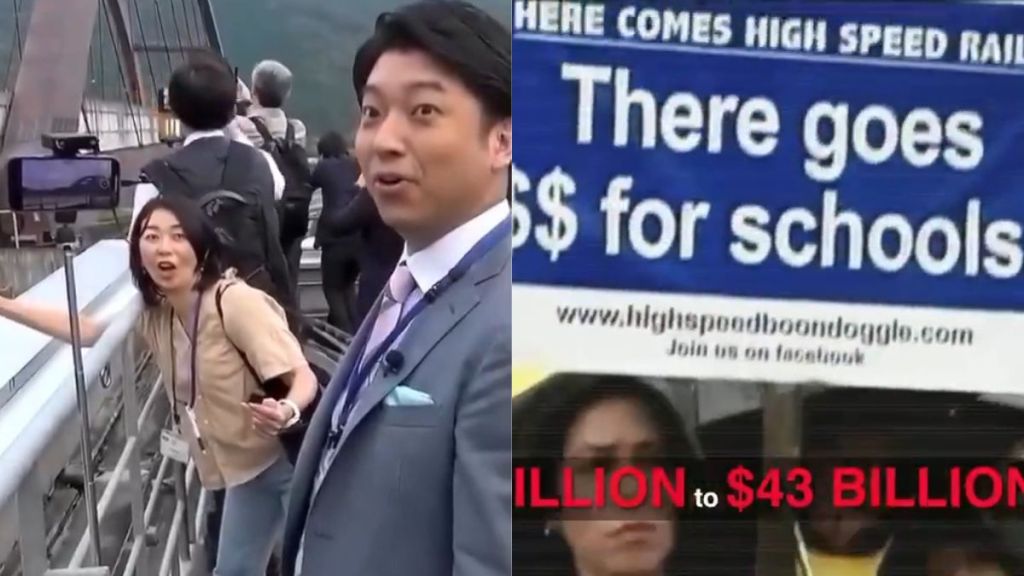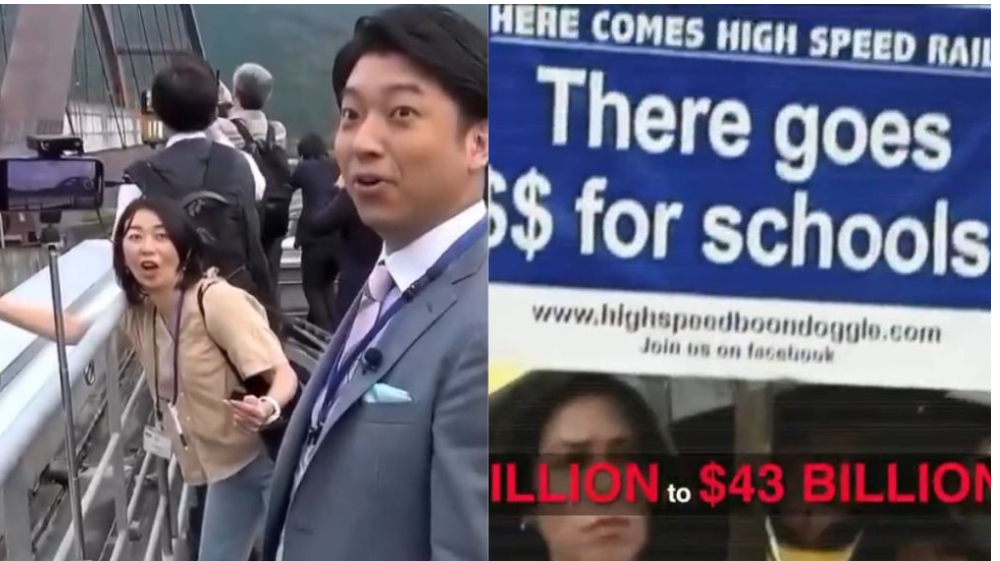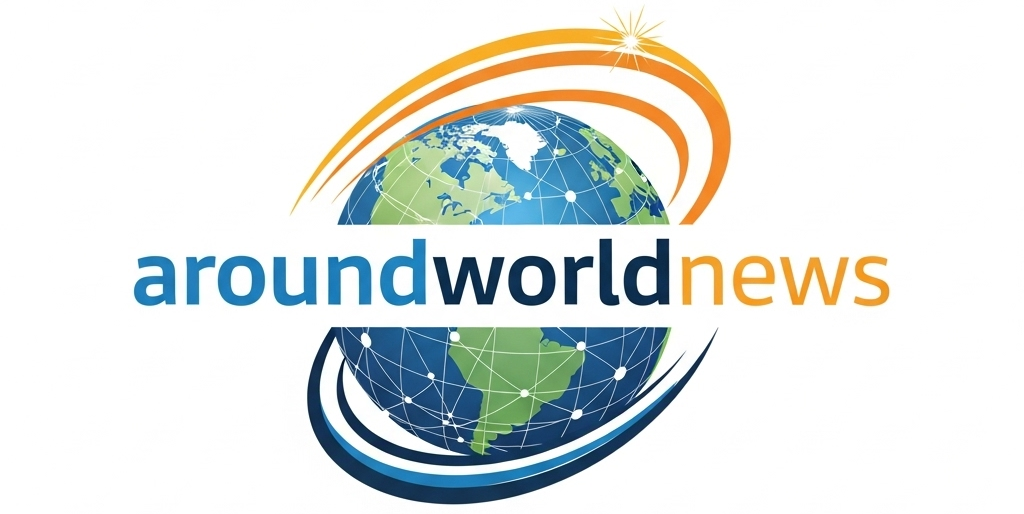Billions lost in California’s train effort’: Resurfaced Japanese Maglev train video sparks US, India debates

Billions lost in California’s train effort’: Resurfaced Japanese Maglev train video sparks US, India debates
A viral video of the Japanese Maglev train resurfaced this week. Both the Indians and Californians alike jumped on the Internet bandwagon, sparking debates and fact checks.
Follow Us

An already-viral video of the world’s fastest – the Japanese Maglev (magnetic levitation) bullet train – resurfaced this week, sparking renewed awe and debate among global netizens, but even more so among Americans and Indians.
The clip capturing wide-eyed, speechless reporters’ awestruck reaction to Central Japan Railway Company (JR Central) and the Railway Technical Institute’s ‘blink-and-you-miss-it’ superconducting magnetic train left the Internet equally stunned earlier this year. The same video’s emergence can be dated back to January 2025 on the platform X. Consequently, it has regained life time and again over the past few months.
“Reporter left speechless after witnessing Japan’s new $70 million Maglev train in action at 310 mph (498.897 kilometres an hour),” read the message alongside the video finding new life on X yet again.
Japanese Maglev train cost estimate: Debate ensues
Alongside this particular resurfaced post gaining numbers on social media, another post pushed by a page called ‘The New India’ compared the cost of Varanasi’s (India) ropeway project and the Japanese bullet train. It suggested that the Maglev train’s cost is Rs 616 crore ($70 million), the “cost of 3.75 km ropeway built in Varanasi is Rs 800 crore.”
Fake news-busting X page ‘PIB Fact Check,’ which is followed by the official Indian Government’s Ministry of Defence handle on the Elon Musk-led platform, has since debunked the claims, labelling them as “misleading.” The fact check page says, “The cost of Japan’s single set of Maglev train has been wrongly compared to the total cost of Varanasi’s ropeway project. The actual cost of the entire Maglev train project is much higher.”
According to JR Central’s April 2021 announcement the total cost for the first phase of the Maglev train project was estimated at $64 billion, marking a surge of almost $14 billion as compared to the original approximation. The cost of a single set remains unclear.
Japanese Maglev train vs California train effort
American writer Victor Bigham picked apart the video to pitch a different angle for a worthy debate. Sharing the same-old video of the Japanese train, he wrote, “And compare that to the billions lost in California’s train effort with nothing to show for it.” Another user commented under Bigham’s post: “Difference is Japan was building a high-speed rail system. California was milking taxpayer funds with no real intention of building anything.”
Alluding to the purported $70 million cost mentioned in connection with Japan’s Maglev train in the post, a third user claimed, “70 million is just a partial amount of what the Democrats stole from the California train project.”
Similarly, Jordan Thibodeau from San Jose, California, chimed in on X. Tagging the state’s Governor Gavin Newsom, he tweeted along with the clip, “The average Californian can’t fathom a functioning high-speed rail, one that runs at 310 MPH and skips meaningless cities.”
Despite being in the pipeline for over 15 years, the high-speed train project connecting San Francisco and Los Angeles appears to be a far cry from reality. Being years behind schedule, it’s already suffered a billions-worth budget nightmare. The Trump administration’s US Transportation Secretary Sean Duffy called the whole project a “boondoggle” and a “high-speed train to nowhere.”
In July, he shared a curt message challenging Newsom and the high-speed train project vision, putting out a video compilation capturing an over-the-years review of the ambitious endeavour already gone wrong. The clip showed how the estimated budget for the same was reported to have shot up from $33 billion to $43 billion in 2010.
“Governor Newsom and California’s high speed rail boondoggle are the definition of government incompetence and possibly corruption,” Duffy wrote in the post. Capturing the mind-boggling rate at which the overall estimated cost for the project had skyrocketed over the years, he added, “The price tag has gone from $33B to $135B with no completion date in sight.”
Sending out a warning to Newsom, Duffy said that he wanted to play no part in such a vision that was nowhere, pulling the plug on federal funding for the same.
Last month, the California High-Speed Rail Authority shared an updated report, manifesting a new strategy that suggested the project could end up connecting the Central Valley to the southern edge of the San Francisco Bay Area and the northern edge of Greater Los Angeles by 2038. However, its completion inevitably hinges on more money backing its finances.





